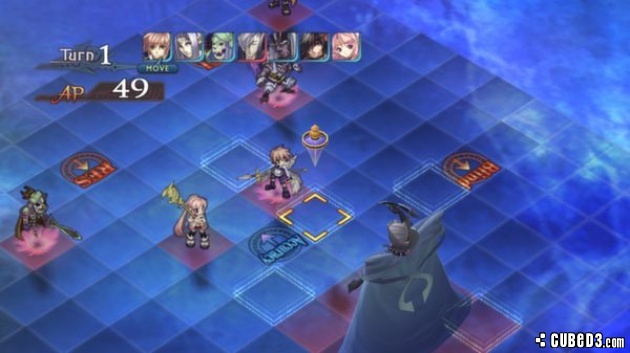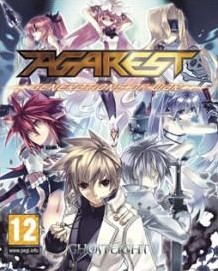Agarest: Generations of War (PC) Review
By Ian Soltes  01.10.2014
01.10.2014

Agarest: Generations of War is a JRPG that is firmly rooted in Japan that won't really make the cross over to American gamers, but doesn't really falter in any areas, either. Developed by Idea Factory and published by Ghostlight LTD, Agarest: Generations of War is one of the more recent entries in the 'Record of the X War' series. The game is a solid throwback to the older eras of gaming, especially in JRPGs, filled with such things as sprite-based graphics and pre-rendered character designs that would not be found in modern games. While the game does not excel in any particular area, neither does it fail in any area beyond reaching out to an audience that is not already firmly within its pen.
Agarest: Generations of War is a firm throwback to the days of yore with RPGs and does not try to hide this fact in the slightest, and, instead, seeks to thrive off of how dated it has become. That is not to say that the game is bad, as many games have excelled with 'dated' mechanics, but Agarest does not seem to truly take advantage or deny this, which leaves the game as a middling experience that is mediocre in all of its forms.
That is not to say that the game is bad by any means, though, as it is quite easy to end up lost in it, spending time seeking to resolve even minor details that look like they would be lacking in depth, only to hold a surprising amount within. However, just as things with a large amount of depth can be fun, they can also be stifling, and at times it is quite easy to also feel like both the player and game are drowning under the sheer weight of detail and micromanagement that can happen.

One of the interesting, and both cool and annoying at the same time, features is how the game takes place over a series of generations. This results in a rotating roster of characters that gets altered to various degrees with each new generation. This can be enjoyable as the heroes' little boy becomes a man seeking to uphold the legacy of his father who flattened the main boss of the prior generation in one turn, but can be also quite annoying as the nice spear-wielding woman who was a solid all-around fighter has outright vanished from the roster, leaving a mostly-useless gunslinger whom was untrained on the team in her stead.
Agarest's story follows the life of one Leonhardt, whom ends up caught up in a pact with a mysterious woman named Dyshana, whom desires souls and loyalty of, not only himself, but the next several generations of his bloodline as payment for saving his own life, allowing him to intervene and save the life of a child named Ellis, and seek out the black knight, whom mortally wounded him in the first place. As such, the game takes place over the five generations of characters, from Leonhardt down to his great descendants. Within each generation there is a main plotline dealing with the current events in the world followed up by the over-arching plot between the various generations. A result of this multi-generational story is that each generation features the main character going through a sort of 'dating sim' in which, based upon their actions and interactions with the rest of the group, especially the women, one of several potential brides will be chosen at the end of each generation, whom the main character can pick to bear the hero of the next generation. This is surprisingly deep as it can lead to the player opting to pick a bride they dislike over one that they do for better stats, or opting for a different path for the chance of a new event to bolster their relationships with one of the women.

This does come with a drawback in the form of the three women not being transferred between generations, so it is questionable if the player should even consider deploying any of the women whom they do not intend to marry over another character whom may transfer over to the next generation.
While Agarest takes place in the fairly standard turn-based format upon a grid-based map, calling it 'simple' would be a vast understatement of what the game is. Even something as seemingly straightforward as movement can become a very tactical choice, and for good reason. The game features a system of points that are granted to a player each and every turn. These points are used for various things such as both moving and attacking, so moving to just the right square to use up as few points as possible to unleash as powerful a combination of attacks as possible is a very key thing.

To further accent this is the ability to perform 'Linked Attacks.' In a nutshell, by positioning a character just right they can link up to other characters and, when they decide to attack a foe, that other character can lend their own aid. It may sound simple on the cover, but proper use of this system can lead to some truly amazing tactical choices, such as linking up with a low-movement character all the way on the other side of the map and using the link to transport him across the map, deal his damage to the foe, and then be in position to pummel another foe come his actual turn! Better yet, if a character is too slow to kill off a foe, but the player has a faster character in range of the foe, they can use a Linked Attack to get that character to act right away as opposed to having to wait for their standard turn. To top it all off, by mixing and using certain abilities, characters can unleash special attacks that deal more damage and generally surpass anything that could happen with the standard attacks, such as adding in AoE elements to an attack, or simply dealing far more damage than before.
However, outside of combat the game is simply uninteresting. Most battles are scripted with the player having to undertake a series of pre-set battles to move between locations. While there are various degrees of points such as Technique Points and Enhancement Points, this can feel overburdening or needlessly complicated at times, and never really feels exceptional. The various things that can be done end up feeling very routine on the whole and, despite the interesting battle system, can easily result in a dreary feeling as the same motions are repeated again and again.

Cubed3 Rating
Good
Agarest: Generations of War is not for everyone, and those who feel it should be for everyone will be sorely disappointed. However, for those it will appeal to, it is not a terrible game and does have its moments where its potential shines, but it never feels like it is about to truly transcend that into becoming an outstanding game. It is what it is. Play it or do not. There will be no regrets either way.

![]() 6/10
6/10
![]() 5/10
(1 Votes)
5/10
(1 Votes)
 Out now
Out now  Out now
Out now  None
None  Out now
Out now Comments
Comments are currently disabled

 Sign In
Sign In Game Details
Game Details Subscribe to this topic
Subscribe to this topic Features
Features






 Top
Top

